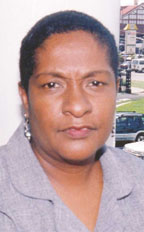As the third and final day of the Consideration of the 2010 Estimates of Expenditure by the Committee of Supply got underway yesterday, Backer grilled Rohee on CPG’s after he disclosed that $24.2M budgeted under the heading of ‘Other’ was for the activities and operations of these groups. Quizzed by Backer on whether he would agree that community policing would be better served if it was under the control of the Commissioner of Police (COP) rather than himself as recommended by various experts and documents that the government has embraced, Rohee responded that this is a perennial question that she has been raising.
He stated that at the level of policy, a decision has been arrived at that there are certain aspects of the community policing activities that would fall to the Guyana Police Force given the fact that a number of members of the CPGs are rural constables (RC) and therefore fall under the Police Act. There are a number of members of CPGs who are not RCs and are civilians and therefore fall under the Minister of Home Affairs so they work closely with the police on community policing, Rohee said.
Further questioned on whether he would agree that the role of any subject minister is one of more policy and projection and quality control rather than the hands-on control of any entity, Rohee to shouts of “well ask her”, said that he did not know what Backer was referring to.

He said that if she was implying that there is some political control and a hands-on approach in respect of community policing, “I don’t see a difficulty with the approach being hands-on”. On the question of control however, Rohee pointed to his earlier answer: that RC’s in community policing activities fall to the COP whereas civilians are associated with the Ministry.
The Chairman of the Committee of Supply, Ralph Ramkarran interjected that he would not permit any debate on policy matters, noting that estimates are being dealt with.
Meantime, under further grilling by Backer, Rohee said that there is a shortage of 400 constables and 300 corporals. Further, $24.6M has been budgeted for the handling and storage of bodies. $28.2M has been allocated for training and Rohee said that this is for both overseas and local training of police. He would not disclose the area of expertise of the training only saying that it is security-related. “There are some details that we wouldn’t want to get into at this point in time but there are some general areas and some specific areas as well that is needed by the Guyana Police Force”.
Asked by Backer on whether the site for a forensic lab has been identified and if so, when would work begin, Rohee responded in the affirmative and stated that the contract has been awarded for the design of the building and negotiations have begun with the university authorities on the matter. “It is anticipated that the construction will start this year and hopefully by the end of this year we will have the forensic lab structure in place”, he said.
And government will this year, spend $37M for a water cannon and it will be for “maintaining public order in the streets and to be used against demonstrators”. Boats are to be purchased this year and Rohee, admitting that he is not aware of the number of operable boats the police has, stated that the Force does not have enough and more are needed.





